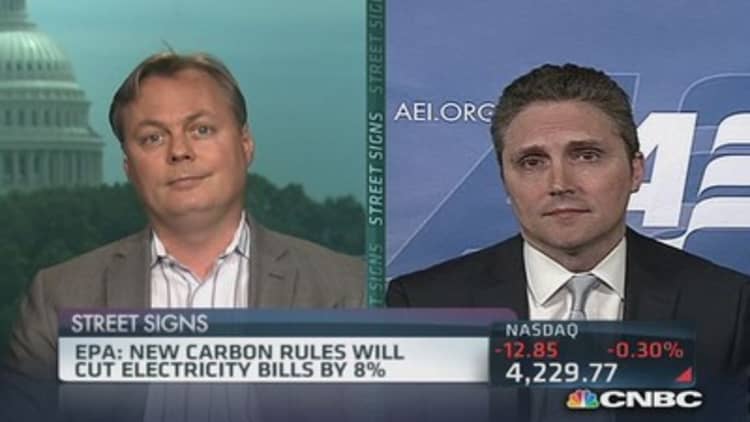
A new proposal by the Environmental Protection Agency to reduce carbon emissions is "modest" and won't negatively affect the consumer, Public Citizen's Tyson Slocum told CNBC.
According to the EPA's new regulations, U.S. power plants must cut carbon emissions 30 percent by 2030 from 2005 levels. Each state will create its own plan.
"This plan is not about raising prices, the goals are too modest and the states have too much flexibility," Slocum said in an interview with "Street Signs."
"The rules give so much flexibility to electric utilities and states to come up with plans, including energy efficiency, renewable energy deployment [and] investments in the grid, to offset coal emissions."
Read MoreUS unveils sweeping plan to slash power plant pollution
However, a recent study by the U.S. Chamber of Commerce said the new regulations will cost the economy $50 billion a year and raise consumers' electric bills.
"The whole point of these plans is to raise energy prices," said American Enterprise Institute's Jim Pethokoukis, also a CNBC contributor.
Read MoreWhat 'war on coal'? The carbon fuel is doing fine
He said the new regulations are a cap-and-trade plan pushed down to the state level.
"The history of these cap-and-trade systems is they don't really do much to reduce carbon emissions," Pethokoukis said. "If you are worried about climate change, you really need a lot more … public federal investment and that's not in this plan."
Slocum agrees more is needed, but said Congress is nowhere near a bipartisan agreement on a national energy plan. In the meantime, the EPA has given the utility industry a roadmap it desperately needed.
"Since 2005, emissions have actually gone down by 15 percent," Slocum said. "So, before the rules kick in, we are already halfway to the finish line."
Read MoreReports of coal's demise are greatly exaggerated
—By CNBC's Michelle Fox


